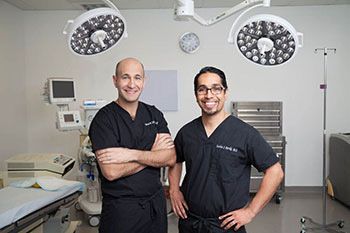Hair Loss in Men

Hair Loss Treatment for Men
Lost and Thinning Hair: Men in the San Francisco Bay Area
Androgenic alopecia, a hereditary form of hair loss, causes stress and embarrassment in women and men alike, though men make up the largest group of sufferers. In the United States, an estimated 70 percent of adult males are expected to lose some or most of their hair due to what’s more commonly known as male pattern baldness. Because of this, we regularly meet patients interested in hair loss treatment for men at the San Francisco Bay Area’s L&P Aesthetics Center for Hair Restoration.
An important thing to remember is that more than just androgenic alopecia can cause thinning and baldness, so any hair loss treatment for men needs to start with identifying the root cause. Dr. David Lieberman and Dr. Sachin Parikh work with each patient as an individual to determine the reason behind his loss, stop it if possible, and then develop a plan to restore what was lost, along with his confidence. Their goal is to provide a new, healthy, natural-looking head of hair.
Many Reasons: The Causes of Male Hair Loss
As noted above, hair loss treatment for men begins with determining what’s causing their thinning hair. Men who notice more of their scalp showing than they would like, or who find a startling number of strands in their comb or on their pillow, should know that it may be due to any number of causes, ranging from environmental factors to medical conditions to genetics and age. A thorough consultation, coupled with blood tests or other tests as necessary, will help to develop a theory that can lead to a solution.
Daily Hair Loss in Men
Each hair goes through a life cycle that ends with it falling out on its own. This is a natural process that results in anywhere from 50 to 150 hairs lost each day. These hairs are replaced by new, healthy shafts, and since this is a staggered and ongoing part of life, it won’t create any sparse patches that require hair loss treatment. For men who experience a greater volume of daily loss or noticeable thinning patches, more investigation is required.
Hereditary Hair Loss in Men
Androgenic alopecia is the most frequent cause of thinning hair. Men who notice a recession in their hairline or at their temples, or who develop an increasingly bare patch on their crown, are likely facing this genetic culprit. The specific severity of their hair loss can be compared to illustrations on a chart known as the Norwood Scale. Given the predictable nature of this hereditary condition, doctors can determine the best hair loss treatment for men whose current stage of male pattern baldness has been identified.
Non-Hereditary Hair Loss in Men (Non-Androgenic Alopecia)
Telogen effluvium is a sudden and spontaneous shift that moves a large number of hairs from active growth to a resting phase, after which they fall out. Triggered by a system-wide stress of some kind, this condition can lead to the loss of hundreds of hairs a day. Potential triggers include illness, emotional trauma, and more. Hair loss treatment for men who suffer from this particular type of disruption is typically not necessary, since new growth returns as follicles eventually move once again into a growth phase. There are many possible causes of the lost or thinning hair men may experience apart from androgenic alopecia:
- Hormones:
A hormonal imbalance, especially an overabundance of testosterone, can trigger hair loss. Determining the cause of the imbalance, whether diet, thyroid issues, or a menopause-like shift known as andropause, can be important to your overall health, as well as your hair. The recommended hair loss treatment for men with this identified cause depends on the specifics of each case. - Medical conditions:
Chronic illnesses and autoimmune diseases may trigger hair loss, so discovering the cause could be a medical priority, especially when there are other symptoms to consider. Note that rheumatoid arthritis, lupus, and diabetes can all contribute to hair loss, as can other diseases, so symptoms should be analyzed by a doctor with experience in diagnosing such problems. Hair loss treatment for men with such a condition may involve mitigating the symptoms if a cure for the underlying disease isn’t possible. - Infection: Scalp infections can alter hair’s natural cycles. Antibiotics could stop the infection and restore equilibrium on your head, leading to re-growth. Good head hygiene, including the regular washing of any caps or hats worn regularly, can help to combat infection and the subsequent need for hair loss treatment for men.
- Medicine/drugs:
From easy to obtain natural remedies to over-the-counter medications to prescription pharmaceuticals, medicine can impact hair growth and loss. Talk to your doctors about the side effects associated with any supplements, pills, drops, or other medications you may be taking. Hair loss treatment for men in this situation may be as simple as discontinuing the product’s use if possible or switching to a different brand or treatment. In some cases, such as chemotherapy, an alternative may be unavailable or undesirable. - Injury:
A cut, scrape, impact, or burn to the scalp can temporarily or permanently inhibit proper hair growth by damaging a follicle or creating scar tissue. Hair loss treatment for men with physical trauma depends on the type of wound or injury, as well as how it healed. - Other factors:
Since there are so many environmental and physical influences that can contribute to thinning hair, men looking for answers should be prepared to honestly answer questions during a thorough and detailed consultation.
Restoring Hope: Hair Loss Treatment for Men
he L&P Aesthetics Center for Hair Restoration team members are committed to discovering the cause of hair loss in every patient who comes to them for help, but that discovery is only the first step.
The suggested hair loss treatment for men who seek our services may be a non-surgical option, such as making a dietary change or patiently waiting for new hair to grow in after a system shock.
Confirmed male pattern baldness may involve non-surgical treatments, including topical medications, our L&P Stimulate Program, and the minimally invasive microneedling.

One particularly effective hair loss treatment for men is a surgical procedure with reliably consistent and natural results: follicular unit extraction. The advanced techniques and precision instruments employed at the center consistently yield the best outcomes available in the industry today.
Not every option is ideal for every patient, but there are plenty of variations in hair loss treatment for men. The results-driven team will work to tailor each recommended procedure with one simple end goal: a healthy, confidence-boosting, natural-looking head of hair.

Women and Hair Loss
When it comes to issues of thinning hair, men aren’t the only ones who suffer from the hereditary hassle. Women who deal with hair loss may find that they are experiencing a female-specific form of androgenic alopecia. Hair loss in women is more common than some sufferers realize, making it a problem that is fairly prevalent but not often talked about. Since hair loss treatment for men and women alike is available, the doctors and team at the center are prepared to answer any person’s questions about hair loss and regrowth, whether the asker is male or female.
